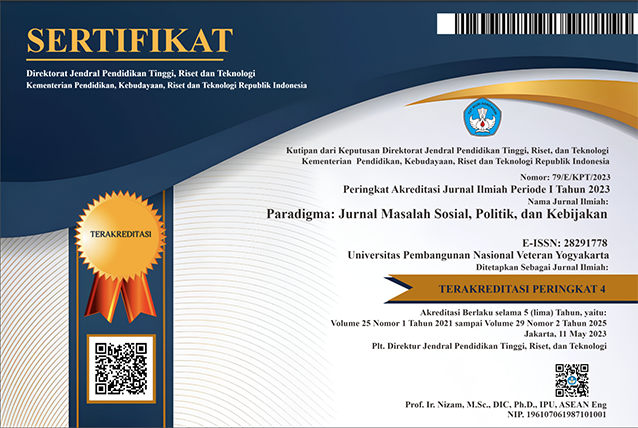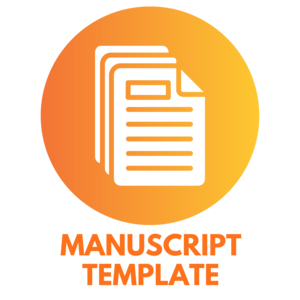The Role of Social Media Literacy and Use in Determining Emotional Wellbeing
DOI:
https://doi.org/10.31315/paradigma.v28i2.13148Keywords:
social-media, media literacy, adolescents, social media usersAbstract
Social media life is where communication and individuals and communities are characterized through social media networks. Concerns about the adverse effects of social media have directed public attention to media literacy as a potential solution. The SMILE Model is an effort to equip social media literacy that can influence social media use (in terms of exposure and self-expression), ultimately positively impacting individual/adolescent well-being. The results showed that most respondents preferred video content and a combination of video and text. Influencers' influence also influenced the use of social media, but only 25% of respondents felt that influencers had a significant impact on their use. Good social media literacy involves cognitive understanding and emotional regulation to improve emotional well-being. Balanced and healthy social media use can reduce loneliness and increase social support.References
Aarsand, P., & Melander, H. (2016). Appropriation through guided participation: Media literacy in children׳s everyday lives. Discourse, Context and Media, 12, 20–31. https://doi.org/10.1016/j.dcm.2016.03.002
Bonsaksen, T., Ruffolo, M., Leung, J., Price, D., Thygesen, H., Schoultz, M., & Geirdal, A. Ø. (2021). Loneliness and Its Association with Social Media Use During the COVID-19 Outbreak. Social Media + Society, 7(3), 20563051211033820. https://doi.org/10.1177/20563051211033821
Aisyaroh, N., Hudaya, I., & Supradewi, R. (2022). Trend Penelitian Kesehatan Mental Remaja di Indonesia Dan Faktor Yang Mempengaruhi: Literature Review. Scientific Proceedings of Islamic and Complementary Medicine, 1(1), 41–51. https://doi.org/10.55116/spicm.v1i1.6
Cho, H., Cannon, J., Lopez, R., & Li, W. (2022). Social media literacy: A conceptual framework. New Media & Society, 26(2), 941–960. https://doi.org/10.1177/14614448211068530
Cindy Mutia Annur. (2021). Persentase Anak Usia 5 Tahun ke Atas yang Mengakses Internet Menurut Tujuan (2021). https://databoks.katadata.co.id/datapublish/2021/11/24/bps-8899-anak-5-tahun-ke-atas-mengakses-internet-untuk-media-sosial
Claresta, H., & Tamburian, D. (2021). Self-Disclosure of Adolescent Girls on TikTok Social Media.
Dame Adjin-Tettey, T. (2022). Combating fake news, disinformation, and misinformation: Experimental evidence for media literacy education. Cogent Arts & Humanities, 9(1), 2037229. https://doi.org/10.1080/23311983.2022.2037229
Devianti, R., Ningrum, S., Kencana, R., Siswanto, I., & Amalia, N. (2023). Parenting Anak Berkualitas Di Generasi Alpha. Jurnal Sentra Pendidikan Anak Usia Dini, 2(2), 88–96. https://doi.org/10.51544/sentra.v2i2.4236
Dimas Ongko Wijoyo. (2023a). Analisis Media Sosial Mengenai Isu Indonesia Sebagai Negara Paling Tidak Sopan di Asia Tenggara. Jurnal Riset Manajemen Komunikasi, 3(1), 1–6. https://doi.org/10.29313/jrmk.v3i1.1015
Dimas Ongko Wijoyo. (2023b). Analisis Media Sosial Mengenai Isu Indonesia Sebagai Negara Paling Tidak Sopan di Asia Tenggara. Jurnal Riset Manajemen Komunikasi, 3(1), 1–6. https://doi.org/10.29313/jrmk.v3i1.1015
Festl, R. (2021). Social media literacy & adolescent social online behavior in Germany. Journal of Children and Media, 15(2), 249–271. https://doi.org/10.1080/17482798.2020.1770110
Kalorth, N., Verma, M., & Sagar, M. (2020). Information And User: Social Media Literacy In Digital Societies. Journal of Content, Community and Communication, 12, 263–269. https://doi.org/10.31620/JCCC.12.20/24
Koutamanis, M., Vossen, H. G. M., & Valkenburg, P. M. (2015). Adolescents’ comments in social media: Why do adolescents receive negative feedback and who is most at risk? Computers in Human Behavior, 53, 486–494. https://doi.org/https://doi.org/10.1016/j.chb.2015.07.016
Kurniawati, J. (2016). Literasi Media Digital Mahasiswa Universitas Muhammadiyah Bengkulu (Survei Tingkat Literasi Media Digital pada Mahasiswa Universitas Muhammadiyah Bengkulu Ditinjau dari Aspek Individual Competence). Jurnal Komunikator, 8(2 November 1016), 51–66. https://journal.umy.ac.id/index.php/jkm/article/view/2069
Livingstone, S. (2014). Developing social media literacy: How children learn to interpret risky opportunities on social network sites. 39(3), 283–303. https://doi.org/doi:10.1515/commun-2014-0113
Lup, K., Trub, L., & Rosenthal, L. (2015). Instagram #Instasad?: Exploring Associations Among Instagram Use, Depressive Symptoms, Negative Social Comparison, and Strangers Followed. Cyberpsychology, Behavior and Social Networking, 18, 247–252. https://doi.org/10.1089/cyber.2014.0560
Mmari, K., Cooper, D., Moreau, C., Koenig, L., Martinez, M., Mafuta, E., Kayembe, P., De Meyer, S., Michielson, K., Yu, C., Zuo, X., & Blum, R. Wm. (2021). The Social Context of Early Adolescents in the Global Early Adolescent Study. Journal of Adolescent Health, 69(1, Supplement), S5–S15. https://doi.org/https://doi.org/10.1016/j.jadohealth.2021.01.024
Nabilah Muhamad. (n.d.). Persentase Anak Muda* Indonesia yang Menggunakan Internet Berdasarkan Tujuan (Maret 2023). Retrieved March 27, 2024, from https://databoks.katadata.co.id/datapublish/2024/01/11/mayoritas-anak-muda-indonesia-gunakan-internet-untuk-media-sosial
Polanco-Levicán, K., & Salvo-Garrido, S. (2022). Understanding Social Media Literacy: A Systematic Review of the Concept and Its Competences. In International Journal of Environmental Research and Public Health (Vol. 19, Issue 14). MDPI. https://doi.org/10.3390/ijerph19148807
Rijal Fadli, M. (2021). Memahami desain metode penelitian kualitatif. 21(1), 33–54. https://doi.org/10.21831/hum.v21i1
Rizqi Fitri Ardiani, E., Noviana, I., Mariana, A., Nurrohmah Bimbingan dan Konseling, S., & Ilmu Pendidikan, F. (2021). Kesantunan Berkomunikasi pada Media Sosial di Era Digital. Sultan Agung Fundamental Research Journal ||, 2(2). https://doi.org/10.30659/safrj.2.2.65-76
Schmuck, D. (2021). Following Social Media Influencers in Early Adolescence: Fear of Missing Out, Social Well-Being and Supportive Communication with Parents. Journal of Computer-Mediated Communication, 26(5), 245–264. https://doi.org/10.1093/jcmc/zmab008
Schreurs, L., & Vandenbosch, L. (2020). Introducing the Social Media Literacy (SMILE) Model with the Case of the Positivity Bias on Social Media. Journal of Children and Media, 15. https://doi.org/10.1080/17482798.2020.1809481
Taibi, D., Scifo, L., Bruno, N., & Fulantelli, G. (2023). Social Media Literacy to Support a Conscious Use of Social Media in Adolescents and Improve Their Psychological Well-Being: A Pilot Study. Sustainability, 15, 12726. https://doi.org/10.3390/su151712726
Unicef. (2021). Profil Remaja 2021 Gambaran Umum. https://www.unicef.org/indonesia/media/9546/file/Profil%20Remaja.pdf
Vraga, E., Bode, L., & Troller-Renfree, S. (2016). Beyond Self-Reports: Using Eye Tracking to Measure Topic and Style Differences in Attention to Social Media Content. Communication Methods and Measures, 10, 149–164. https://doi.org/10.1080/19312458.2016.1150443
Wang, Y., McKee, M., Torbica, A., & Stuckler, D. (2019). Systematic Literature Review on the Spread of Health-related Misinformation on Social Media. Social Science & Medicine, 240, 112552. https://doi.org/https://doi.org/10.1016/j.socscimed.2019.112552
Zamaa, M. S., Renaldi, M., & Agus, L. (2023). Hubungan Lama Penggunaan Handphone Pada Anak Dengan Gangguan Penglihatan Miopia di Jakarta Eye Center Orbita Makassar. Jurnal Mitrasehat, 13(1), 303–310.
Downloads
Published
How to Cite
Issue
Section
License
The manuscript submitted to Paradigma: Jurnal Masalah Sosial, Politik, dan Kebijakan journals are released under the license of Creative Commons Attribution-Non Commercial- ShareAlike (CC BY SA) if and when the article is accepted for publication.
We declare that:
- This paper has not been published in the same form elsewhere.
- It will not be submitted anywhere else for publication prior to acceptance/rejection by this Journal.
- A copyright permission is obtained for materials published elsewhere and which require this permission for reproduction.
Retained Rights/Terms and Conditions
Authors retain all proprietary rights to the published works, such as (but not limited to) the following rights:
- Copyright and other proprietary rights relating to the article, such as patent rights,
- The right to use the substance of the article in own future works, including lectures and books,
- The right to reproduce the article for own purposes,
- The right to self-archive the article
The right to enter into separate, additional contractual arrangements for the non-exclusive distribution of the article's published version (e.g., post it to an institutional repository or publish it in a book), with an acknowledgment of its initial publication in this journal Paradigma: Jurnal Masalah Sosial, Politik, dan Kebijakan



